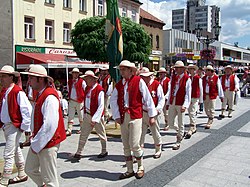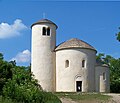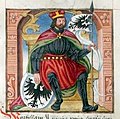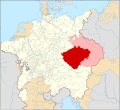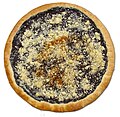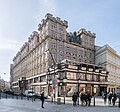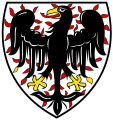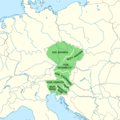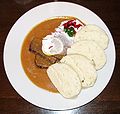Portal:Czech Republic
Welcome to the Czech Portal!
Vítejte na Českém portálu!

|

|

| |
The Czech Republic, also known as Czechia, and historically known as Bohemia, is a landlocked country in Central Europe. The country is bordered by Austria to the south, Germany to the west, Poland to the northeast, and Slovakia to the southeast. The Czech Republic has a hilly landscape that covers an area of 78,871 square kilometers (30,452 sq mi) with a mostly temperate continental and oceanic climate. The capital and largest city is Prague; other major cities and urban areas include Brno, Ostrava, Plzeň and Liberec.
The Duchy of Bohemia was founded in the late 9th century under Great Moravia. It was formally recognized as an Imperial Estate of the Holy Roman Empire in 1002 and became a kingdom in 1198. Following the Battle of Mohács in 1526, all of the Lands of the Bohemian Crown were gradually integrated into the Habsburg monarchy. Nearly a hundred years later, the Protestant Bohemian Revolt led to the Thirty Years' War. After the Battle of White Mountain, the Habsburgs consolidated their rule. With the dissolution of the Holy Roman Empire in 1806, the Crown lands became part of the Austrian Empire.
In the 19th century, the Czech lands became more industrialized; further, in 1918, most of the country became part of the First Czechoslovak Republic following the collapse of Austria-Hungary after World War I. Czechoslovakia was the only country in Central and Eastern Europe to remain a parliamentary democracy during the entirety of the interwar period. After the Munich Agreement in 1938, Nazi Germany systematically took control over the Czech lands. Czechoslovakia was restored in 1945 and three years later became an Eastern Bloc communist state following a coup d'état in 1948. Attempts to liberalize the government and economy were suppressed by a Soviet-led invasion of the country during the Prague Spring in 1968. In November 1989, the Velvet Revolution ended communist rule in the country and restored democracy. On 31 December 1992, Czechoslovakia was peacefully dissolved, with its constituent states becoming the independent states of the Czech Republic and Slovakia.
The Czech Republic is a unitary parliamentary republic and developed country with an advanced, high-income social market economy. It is a welfare state with a European social model, universal health care and free-tuition university education. It ranks 32nd in the Human Development Index. The Czech Republic is a member of the United Nations, NATO, the European Union, the OECD, the OSCE, the Council of Europe and the Visegrád Group. (Full article...)
Selected article -
The Polish minority in the Czech Republic is a Polish national minority living mainly in the Trans-Olza region of western Cieszyn Silesia. The Polish community is the only national (or ethnic) minority in the Czech Republic that is linked to a specific geographical area. Trans-Olza is located in the north-eastern part of the country. It comprises Karviná District and the eastern part of Frýdek-Místek District. Many Poles living in other regions of the Czech Republic have roots in Trans-Olza as well.
Poles formed the largest ethnic group in Cieszyn Silesia in the 19th century, but at the beginning of the 20th century the Czech population grew. The Czechs and Poles collaborated on resisting Germanization movements, but this collaboration ceased after World War I. In 1920 the region of Trans-Olza was incorporated into Czechoslovakia after the Polish–Czechoslovak War. Since then the Polish population demographically decreased. In 1938 it was annexed by Poland in the context of the Munich Agreement and in 1939 by Nazi Germany. The region was then given back to Czechoslovakia after World War II. Polish organizations were re-created, but were banned by the Communist Party of Czechoslovakia. After the Velvet Revolution Polish organizations were re-created again and Trans-Olza had adopted bilingual signs. (Full article...)
Selected picture

Source: Národní Galerie v Praze, PD
In this month
- 2 March 1978 – Vladimír Remek becomes the first man in space from a country other than the United States and USSR
- 6 March 1645 – One of the bloodiest battles of the Thirty Years' War, the Battle of Jankau takes place 50km from Prague
- 16 March 1939 – The Protectorate of Bohemia and Moravia is established following the end of the Second Czechoslovak Republic
- 29 March 1896 – The first Prague derby is played between Sparta and Slavia. The match ends 0–0
- 30 March 1968 – Ludvík Svoboda (pictured) is elected President of Czechoslovakia
Categories
Selected biography -
Markéta Vondroušová (Czech: [ˈmarkɛːta ˈvondrouʃovaː]; born 28 June 1999) is a Czech professional tennis player. She has a career-high singles ranking of No. 6 by the WTA. Vondroušová was the Wimbledon champion in 2023, the first unseeded woman to win the singles title. She was also runner-up at the 2019 French Open where she became the first teenage major finalist since Jelena Ostapenko in 2017.
She has won two singles titles out of six finals on the WTA Tour and a silver medal at the 2020 Tokyo Olympics. Vondroušová is a former junior world No. 1, having won two major doubles titles. She had a quick breakthrough on the WTA Tour, winning the 2017 Ladies Open Biel Bienne at age 17 in just her second career WTA Tour singles event. This helped her reach the top 100 of the WTA rankings before turning 18. Vondroušová struggled with injuries early in her career, most notably missing the second half of the 2019 season shortly after her French Open final. Her signature shot is the drop shot. She is one of the best returners on tour, having led the tour in percentage of return games won and percentage of return points won in 2019 among all players with at least ten matches. (Full article...)
Did you know?

- ...that in 1990, Czech and Slovak politicians "fought" the Hyphen War, a political battle over whether "Czechoslovakia" should be spelled with a hyphen?
- ... that the Cross of Merit of the Minister of Defence of the Czech Republic is the highest award presented by the Czech Minister of Defence?
- ... that footballer Petr Vrabec won six Czechoslovak league titles with Sparta Prague?
- ... that Czech actress Anna Letenská was killed by the Nazis for her alleged participation in the assassination of Reinhard Heydrich?
General images
Related portals
Topics

Czech lands: Bohemia • Moravia • Czech Silesia
History: Únětice culture • Boii • Marcomanni • Samo • Great Moravia • Přemyslid dynasty • Lands of the Bohemian Crown • Czech lands (1526–1648) • 1648–1867 • 1867–1918) • Czechoslovakia • Czech Republic
Geography: Lakes • Protected areas • Regions • Rivers
Law: Judiciary • Law enforcement • Supreme Court of the Czech Republic
Politics: Administrative divisions • Government • Constitution • Elections • Foreign relations • Army • Parliament • Political parties • President • Prime Minister
Economy: Banks • Czech koruna • Energy • Oil and gas deposits • Stock Exchange • Tourism • Transport
Culture: Architecture • Art • Cinema • Cuisine • Demographics • Education • Language • Literature • Media • Music • Philosophy • Prostitution • Public holidays • Religion • Sport • Television • Video games
Symbols: Flag • Coat of arms • National anthem (Kde domov můj)
Lists: Outline of the Czech Republic • List of Czech Republic–related topics
WikiProjects
Featured and good content
Things to do
Wikimedia
The following Wikimedia Foundation sister projects provide more on this subject:
-
Commons
Free media repository -
Wikibooks
Free textbooks and manuals -
Wikidata
Free knowledge base -
Wikinews
Free-content news -
Wikiquote
Collection of quotations -
Wikisource
Free-content library -
Wikiversity
Free learning tools -
Wikivoyage
Free travel guide -
Wiktionary
Dictionary and thesaurus


